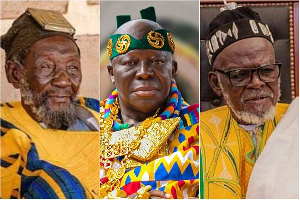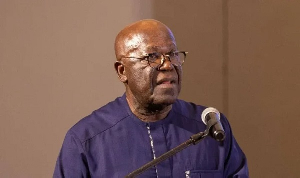Source: ADAM HABEEB GAFFARU (international economist).
Email: ghafman@yahoo.com
INTRODUCTION
Following the release of global corruption barometer report by the Ghana Integrity Initiative (GII) on 9th July, 2013, there were a lot of rigmarole coming particularly from the affected institutions such as the Police that tops all, Judiciary with some members of parliament vehemently denying that there is no possibility of corruption in parliament (see: http://www.ghanaweb.com/GhanaHomePage/NewsArchive/artikel.php?ID=279210). It is against this background that I write to share this information with the general public. As an economic phenomenon, understanding corruption ITS IMPACT ON GOVERNANCE and the methods for reducing corruption require an expedient political - economic analysis. Corruption is interesting not only because it represents market failure but also state failure. Until now, most anti-corruption activities or measures were focused on passing laws and regulations against corruption. This approach has been relatively unproductive as these laws have remained "scare crows" either for the enforcers of the law or for those engaged in corrupt transactions. "If you have ten thousand regulations you destroy all respect for the law." Winston Churchill. Hence the end results is that it is the economy and its citizens that surfers.
Simplifying cumbersome and lengthy laws and regulations, giving more economic freedom to private companies, local governments, and organizations and getting rid of politically driven decisions would substantially reduce corruption opportunities for government officials and bureaucrats.
Corruption is a slippery concept, at a broad level perhaps it may be defined as Transparency International defines it – “abuse of entrusted power for private A more specific definition would be “the abuse of public office for private gain”.
Corruption (from the Latin corruptus) can literally mean to destroy; takes many forms with different types of participants, settings, stakes, techniques and different degrees of cultural legitimacy; is not only about stealing, it can also relate to the abuse of power in decision-making processes. It is a form of behavior that deviates from ethics, morality, tradition, law and civic virtue.
There are three broad classifications of corruption, which are however not mutually exclusive.
Petty Corruption
Define as the use of public office for private benefit in the course of delivering a public service. Usually involves relatively small amounts of money, including bribery (grease money or speed payments) the public servant abuses his/her position by accepting a benefit for what is a routine transaction or approval. The direct victim of this abuse of power is the citizen.
Grand Corruption
The most dangerous and covert type of corruption call it “gargantuan”. Instances where policy making, its design and implementation are compromised by corrupt practices. Found where public officers in high positions (such as councilors), in the process of making decisions of significant economic value, routinely demand bribes or kickbacks for ensuring that tenders or contracts are awarded to specific contractors. Usually occurs at financial, political and administrative centers of power. The judgment debt/Wayome Saga.
Business and political Corruption
It often not regarded as a crime, rather as a means to accelerate business processes. Proponents claim that the end result is not affected; the mechanisms used to achieve the result are simply accelerated; In essence, bureaucracy is bypassed and time is utilized. Include bribery, insider trading, money laundering, embezzlement, tax evasion and accounting irregularities.
Political Corruption
It occurs predominantly in developing and less developed countries, such as Ghana. It usually associated with the electoral process, in the following areas;
1. Voting irregularities( the 2012 presidential election at the supreme court)
2. Nepotism and cronyism
3. Rule of a few
4. False political promises (campaign promises such as free education)
5. Paying journalists for favorable coverage of candidates and parties
6. Influencing voters by the distribution of money, food and/or drink
7. Holding on to power against the will of the people (various coud’tars).
Politicians who extends protection towards enterprises in exchange for contributions towards a political campaign. The case of GHACEM since 1992- Tuesday, 31 July 2007 www.ghanaweb.com and The Statesman
Chaotic and Organized corruption
Organized Corruption
A well-organized system of corruption in which there is a clear idea:
• of whom to bribe;
• how much should be offered
• And are confident that they will receive the favor in return.
Organized corruption is often perpetrated by crime gangs and syndicates and includes white-collar crime and identity theft.
Chaotic Corruption is a disorganized system where there is no clarity regarding whom to bribe and how much payment should be offered opposite organized corruption.
Frequently falling within the ambit of organized corruption includes fraud, extortion, intimidation, money laundering, insider trading, impersonation and identity theft etc. The following forms of corruption can be distinguished:
Bribery
Examples:
• A traffic officer accepting cash in order not to issue a traffic fine.
• A customs official who receives a bribe to ignore legal (or illegal) imports and exports to avoid the payment of duties and levies.
Payroll abuses where personnel lists are inflated with the names of ghost workers and salaries are paid to officials’ friends or relatives.
“I have often noticed that a bribe has that effect – it changes a relationship. The man who offers a bribe gives away a little of his own importance; the bribe once accepted, he becomes the inferior, like a man who has paid for a woman.” Graham Greene, British Novelist
Embezzlement
Theft of resources by persons entrusted with authority and control over these valuable resources. Examples:
• Hospital staff that steals medicines and sells them to private pharmacies.
• Government officials charged with food aid distribution steal a portion of food and sell it to other individuals.
Embezzlement also includes the conversion of government property and personnel for private use. Examples:
1. An official who uses a government vehicle for taking her children to school.
2. An official who uses the government garage to repair his private vehicle.
3. A government official who rents out his public house.
Fraud, A criminal deception, involving some form of trick, false pretence or representation to obtain a benefit or gain unjust advantage.
Example:
1. Claiming T&T allowances without having undertaken a trip;
2. Altering the total on petrol receipts which will be claimed.
Other Examples includes Intimidation, Extortion, Abuse of power, Conflict of interest, Insider trading. An elected official responsible for maintaining all the roads in a Region assign the road repair crews to areas where his/her constituents reside and neglects other areas in similar need of road repairs.
Fanatics or Favoritism, Nepotism, Money laundering, and Identity theft
The modernization of corruption
Modern technology has spawned new techniques of corruption including:
1. Generating/Extraction of internet banking passwords through infected sites/e-mails;
2. Scanning and duplicating electronic details on credit cards
3. Devices on ATM's which read confidential card details
4. Theft of name, identity numbers etc. to provide duplicate fake identities to foreigners.
5. Theft of educational qualifications for job applications.
Factors that cause involvement in corrupt practices include but not limited to:
Low wages and salaries, Range of discretion, Tradition/Culture: it is not uncommon practice in the commercial arena for business transactions to be accompanied by the giving of personal gifts or benefits, ranging from the Christmas bottle of whisky to much more elaborate and extravagant HAJJ attendant under the influence of top politicians. In essence, the root of corruption is greed rather than culture.
The absence of transparency: Transparency is a prerequisite for democracy in which sovereignty is vested in the people and the conduct of civil servants must be open to examination. It is therefore vital that citizens in general and the media (radio, television, newspapers) in particular are guaranteed the right to freedom of speech; the media can inform citizens of any action by a civil servant that might be corrupt in nature and appropriate calls for action can be made.
The absence of accountability: In a democracy, public leaders and civil servants must be accountable to the people they serve. Accountability means that public leaders and officers must provide logical and acceptable explanations for their actions and decisions to the people they serve
The absence of a watchdog institution: If there are no internal or external institutions or bodies that investigate cases of corruption or that act on complaints relating to corruption, employees may take advantage of the fact that the chance of being caught doing something corrupt is remote.
It must be constitutionally stated, the time span that a prisoner particularly corruption related prisoner(s) stay in prison before qualifying for presidential pardon. As that could be politically motivated and the essence of rule of law could gradually fade off. (See: "So Much For 'Zero Tolerance For Corruption"Ghanaweb.com, Friday, 30 May 2008). The main conclusion to be drawn is that undertaking reforms (both economic, political and leadership-will) by reducing institutional weaknesses offers the best hope to overcome corruption. Corruption will not disappear because of reforms. But enforcing the reforms will bring it under control and minimize its adverse consequences so that the country can proceed with its efforts to become a modern, developed nation with a good chance of attaining that goal.
Opinions of Sunday, 14 July 2013
Columnist: Gaffaru, Adam Habeeb
The problems and forms of corruption a nuisance for governance
Entertainment













